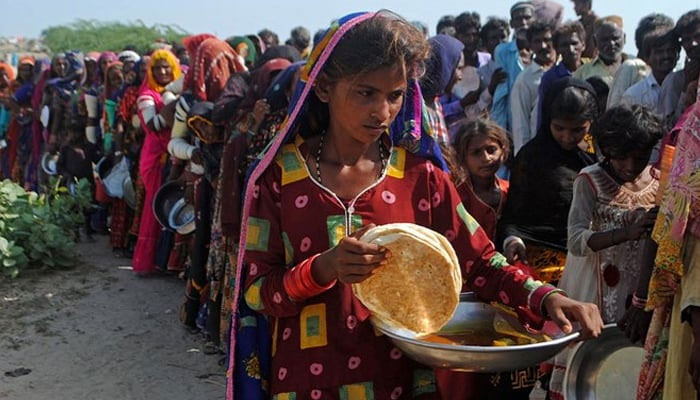Hidden cost
LAHORE: Does providing free meals to the poor improve their lot? Or does it make sense to send a truck load of grocery packets and distribute it without ensuring that the recipient deserves it?
Our culture is such that if a company starts distributing free samples in the street, every passerby would want that sample. It could be tea, a soap, or a pouch of shampoo. Surely this process does not come under charity or philanthropy.
But when it comes to free distribution of groceries without identifying the recipient the distributor thinks of it as a charitable exercise. Sure the goods are distributed to the poor but the distributors have no idea whether the grocery packets they distributed went to different individuals of the same family or it has been distributed fairly among all families of the locality.
A truck load of wheat flour for instance contains at least 200 bags. These bags could be distributed to 200 small residences of the locality. But usually some households snatch seven to eight bags as every family member obtains a bag while the weak ones in the locality get nothing and they include the widows and old men.
The donor spends over Rs200,000 to buy and distribute these bags but did not bother to engage labor assigned to distribute one bag in each house in the slum. There is no slum that has more than 200 residences. By distributing alms randomly and without identification the distributors increase the misery of those that were deprived of the gift as many families snatched much above their share.
The distribution of free meals is done on the same pattern where everyone is accommodated at the time of meal distribution where the same mentality as seen in distribution of samples is observed.
Some institutions have registered the poor families and provided them with cards. These families queue up outside the distribution outlet for lunch and dinner packets. They do not seek employment and become a parasite on society.
The Benazir Income Support Program gives a monthly stipend to the head of a family without knowing whether the amount would be spent on family or consumed solely by the recipient. There is no check and balance.
Research by creditable institutions reveals that the charity donations in Pakistan are among the largest in the world yet we see poverty all over because the charity is not funneled in sustainable projects but is provided as dole out individuals.
Social sector experts point out that charity money in Pakistan exceeds many times the amount government of Pakistan has allocated for the Benazir Income Support Program; but its impact on poverty is negligible because the philanthropists distribute the money in small amounts that may fulfill the immediate the needs of a poor recipient but does not ensure a stable job or business.
We had more poor and destitute at the time of our independence in 1947. The resourceless state was able to rehabilitate them because of the spirit that our elders exhibited at that time. The small industrial and service sector helped the state in running its day to day affairs and the affluent class rehabilitated the largest ever immigrant influx in world history.
Though charity contributions have gradually increased in the country, the impact on poverty and welfare of the people is minimal compared with the excellent results that the philanthropist achieved at the time of independence.
This success was achieved when the state at that time lacked resources and the industry was almost non-existent and the wealth of the affluent families at that time was nominal when compared with the wealth accumulated by individuals and families in present day Pakistan.
-
 Leonardo DiCaprio's Girlfriend Vittoria Ceretti Given 'greatest Honor Of Her Life'
Leonardo DiCaprio's Girlfriend Vittoria Ceretti Given 'greatest Honor Of Her Life' -
 Beatrice, Eugenie’s Reaction Comes Out After Epstein Files Expose Their Personal Lives Even More
Beatrice, Eugenie’s Reaction Comes Out After Epstein Files Expose Their Personal Lives Even More -
 Will Smith Couldn't Make This Dog Part Of His Family: Here's Why
Will Smith Couldn't Make This Dog Part Of His Family: Here's Why -
 Kylie Jenner In Full Nesting Mode With Timothee Chalamet: ‘Pregnancy No Surprise Now’
Kylie Jenner In Full Nesting Mode With Timothee Chalamet: ‘Pregnancy No Surprise Now’ -
 Laura Dern Reflects On Being Rejected Due To Something She Can't Help
Laura Dern Reflects On Being Rejected Due To Something She Can't Help -
 HBO Axed Naomi Watts's 'Game Of Thrones' Sequel For This Reason
HBO Axed Naomi Watts's 'Game Of Thrones' Sequel For This Reason -
 King Charles' Sandringham Estate Gets 'public Safety Message' After Andrew Move
King Charles' Sandringham Estate Gets 'public Safety Message' After Andrew Move -
 Lewis Capaldi Sends Taylor Swift Sweet Message After 'Opalite' Video Role
Lewis Capaldi Sends Taylor Swift Sweet Message After 'Opalite' Video Role -
 Brooklyn Beckham Plunges Victoria, David Beckham Into Marital Woes: ‘They’re Exhausted As It Seeps Into Marriage
Brooklyn Beckham Plunges Victoria, David Beckham Into Marital Woes: ‘They’re Exhausted As It Seeps Into Marriage -
 Sarah Ferguson Joins Andrew In ‘forcing’ Their Daughters Hand: ‘She Can Lose Everything’
Sarah Ferguson Joins Andrew In ‘forcing’ Their Daughters Hand: ‘She Can Lose Everything’ -
 'Bridgerton' Author Reveals If Actors Will Be Recast In Future Seasons
'Bridgerton' Author Reveals If Actors Will Be Recast In Future Seasons -
 50 Cent Super Bowl Ad Goes Viral
50 Cent Super Bowl Ad Goes Viral -
 'The Housemaid' Lifts Company's Profits: Here's How
'The Housemaid' Lifts Company's Profits: Here's How -
 Michael Douglas Recalls Director's Harsh Words Over 'Wall Street' Performance
Michael Douglas Recalls Director's Harsh Words Over 'Wall Street' Performance -
 Henry Czerny On Steve Martin Created Humor On 'Pink Panther' Set
Henry Czerny On Steve Martin Created Humor On 'Pink Panther' Set -
 Lady Victoria Hervey: Andrew Mountbatten-Windsor's Ex-girlfriend Proud Of Being On Epstein Files
Lady Victoria Hervey: Andrew Mountbatten-Windsor's Ex-girlfriend Proud Of Being On Epstein Files




